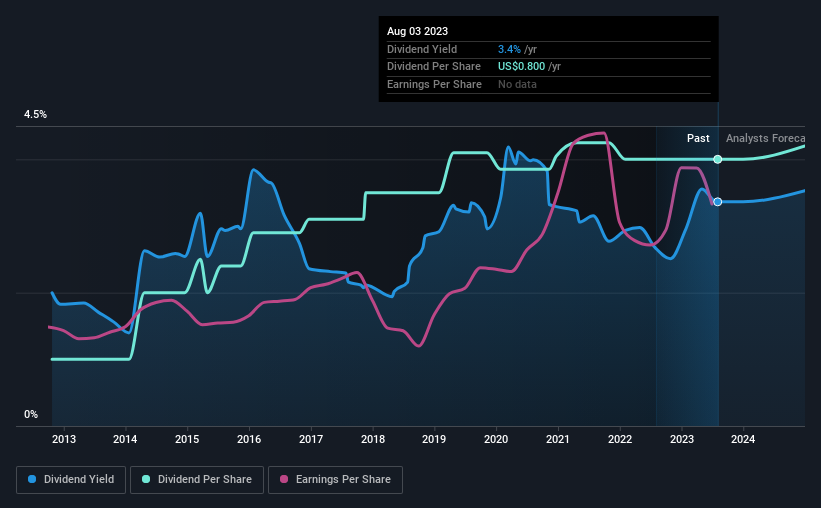Should You Buy Mid Penn Bancorp, Inc. (NASDAQ:MPB) For Its Upcoming Dividend?
Regular readers will know that we love our dividends at Simply Wall St, which is why it's exciting to see Mid Penn Bancorp, Inc. (NASDAQ:MPB) is about to trade ex-dividend in the next 4 days. Typically, the ex-dividend date is one business day before the record date which is the date on which a company determines the shareholders eligible to receive a dividend. It is important to be aware of the ex-dividend date because any trade on the stock needs to have been settled on or before the record date. Accordingly, Mid Penn Bancorp investors that purchase the stock on or after the 9th of August will not receive the dividend, which will be paid on the 28th of August.
The company's next dividend payment will be US$0.20 per share, and in the last 12 months, the company paid a total of US$0.80 per share. Based on the last year's worth of payments, Mid Penn Bancorp stock has a trailing yield of around 3.4% on the current share price of $23.79. We love seeing companies pay a dividend, but it's also important to be sure that laying the golden eggs isn't going to kill our golden goose! As a result, readers should always check whether Mid Penn Bancorp has been able to grow its dividends, or if the dividend might be cut.
View our latest analysis for Mid Penn Bancorp
Dividends are typically paid out of company income, so if a company pays out more than it earned, its dividend is usually at a higher risk of being cut. That's why it's good to see Mid Penn Bancorp paying out a modest 27% of its earnings.
Generally speaking, the lower a company's payout ratios, the more resilient its dividend usually is.
Click here to see the company's payout ratio, plus analyst estimates of its future dividends.
Have Earnings And Dividends Been Growing?
Businesses with strong growth prospects usually make the best dividend payers, because it's easier to grow dividends when earnings per share are improving. If earnings fall far enough, the company could be forced to cut its dividend. For this reason, we're glad to see Mid Penn Bancorp's earnings per share have risen 11% per annum over the last five years.
Another key way to measure a company's dividend prospects is by measuring its historical rate of dividend growth. In the past 10 years, Mid Penn Bancorp has increased its dividend at approximately 15% a year on average. It's great to see earnings per share growing rapidly over several years, and dividends per share growing right along with it.
The Bottom Line
Is Mid Penn Bancorp an attractive dividend stock, or better left on the shelf? Companies like Mid Penn Bancorp that are growing rapidly and paying out a low fraction of earnings, are usually reinvesting heavily in their business. This strategy can add significant value to shareholders over the long term - as long as it's done without issuing too many new shares. In summary, Mid Penn Bancorp appears to have some promise as a dividend stock, and we'd suggest taking a closer look at it.
In light of that, while Mid Penn Bancorp has an appealing dividend, it's worth knowing the risks involved with this stock. For example - Mid Penn Bancorp has 2 warning signs we think you should be aware of.
A common investing mistake is buying the first interesting stock you see. Here you can find a full list of high-yield dividend stocks.
Have feedback on this article? Concerned about the content? Get in touch with us directly. Alternatively, email editorial-team (at) simplywallst.com.
This article by Simply Wall St is general in nature. We provide commentary based on historical data and analyst forecasts only using an unbiased methodology and our articles are not intended to be financial advice. It does not constitute a recommendation to buy or sell any stock, and does not take account of your objectives, or your financial situation. We aim to bring you long-term focused analysis driven by fundamental data. Note that our analysis may not factor in the latest price-sensitive company announcements or qualitative material. Simply Wall St has no position in any stocks mentioned.

